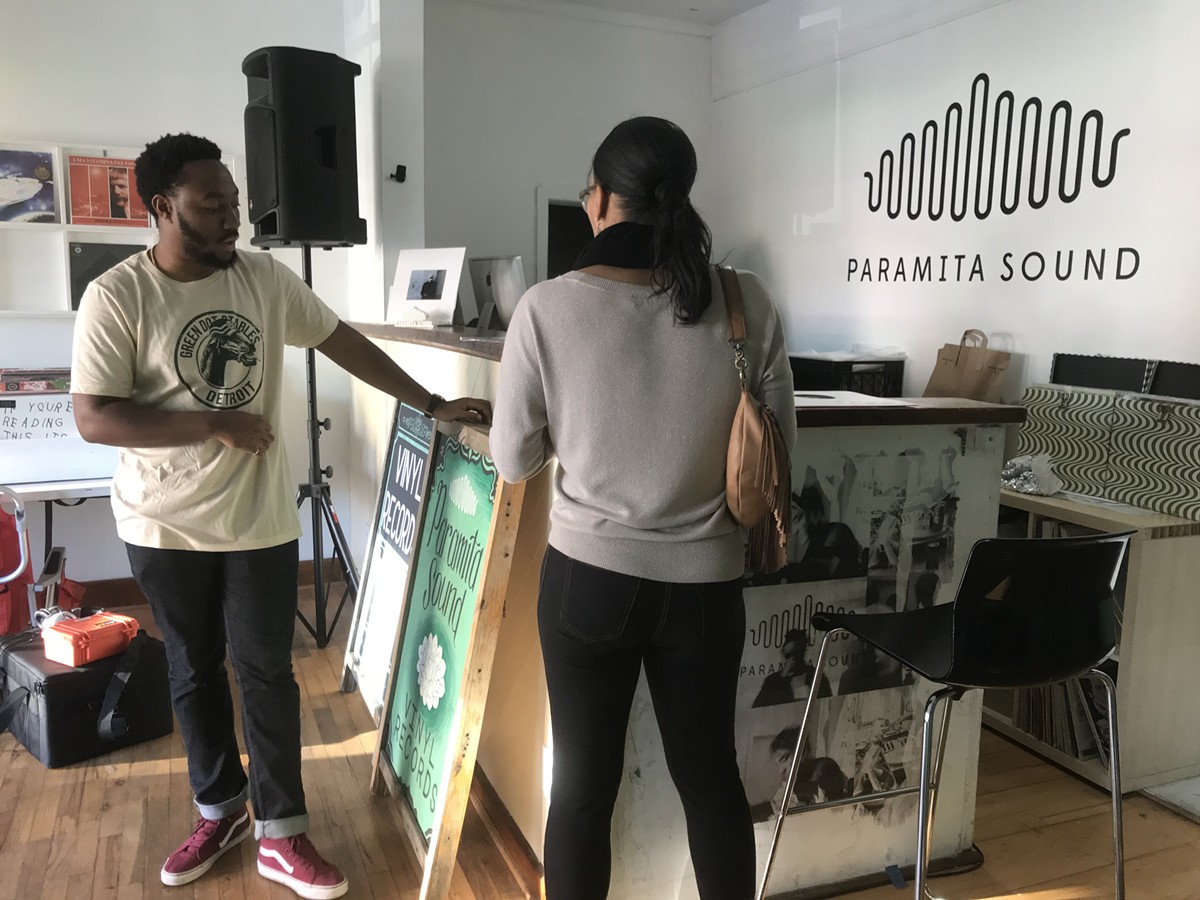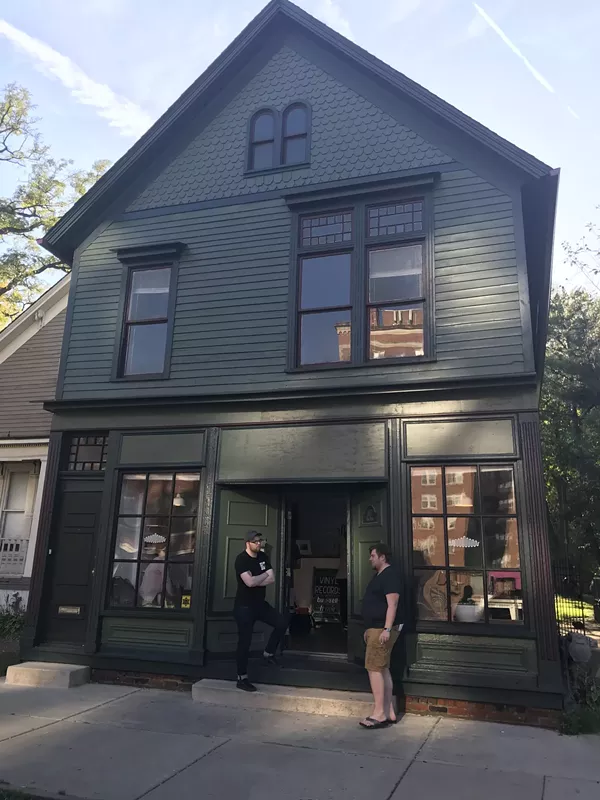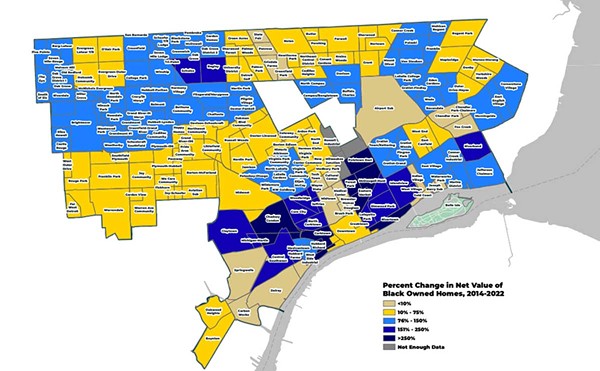Every last Friday night of the month for the past three years, Paramita Sound's free, all-ages Beat Profile has been a place where music lovers or passersby stop in to hear something new. In the winter, listeners pack closely together, thankful for warmth amid the occasional startling breeze as the door creaks open to welcome a new guest. In the summer, attendees trickle out onto the sidewalk as persistent thumps of bass, synth, or ambient noise flow through the mesh screen door.
The West Village record store is the kind of place where local musicians come to debut their new album, play their just-pressed vinyl, or land their first leap into a new genre for a listening audience that possibly includes, but is definitely (finally) not limited to their best friend. For patrons, the event is a rare opportunity where they can check out music on a Friday night regardless of age or income level. It's what Anna Atanassova and Andrey Douthard hoped for when they were selected for a revitalization grant from the neighborhood's community development organization in 2014 and opened the store.
But on Friday, Aug. 25, the sense of community fostered within the walls of the quaint two-story house at 1417 Van Dyke was broken when outsiders arrived.
At first, their presence was evidenced only by a shining light. Atanassova, in the middle of making a record sale, assumed the light to be a flash from a friend's camera and paid it no mind. When it didn't go away, she looked up to find three police officers near the entrance.
The music stopped and the cops began to ask questions. It was approximately 1 a.m., and they thought the party had gone on for too long.
Atanassova's worried eyes met the curious gaze of attendees, some of them teenagers. She instructed them to either go inside or go home.
"All of us are very sensitive when it comes to the police — to us that was a glass house shattering," she says.
For three years, the monthly Beat Profile had been a "harmless" and "self-policing" house party, says Atanassova. They say they tried to keep things reasonable. When performers approached what owners considered a "sweet spot" in the night — when guests were satisfied and neighbors weren't too upset about the noise — attendees would say their goodbyes and leave.
But on this night, the party had drawn the interest of a total of nine police officers. According to guests who were there, they arrived in seven separate squad cars that stretched all the way up the block.
The presence was apparently so strange that when Metro Times called the Detroit Police Department the Monday after the event and asked a spokesperson to look into what happened, he expressed shock at the number of officers that showed up, saying "Don't give me a heart attack!"
The incident marks a 180 degree shift from what Nurah Ikpeama knew the neighborhood to be when she owned the storefront between 2003 and 2007. In those days, Ikpeama says the only time the cops came around her retail shop and event space, 1417 the Village, was when they came to hang out.
"Now you have an increase in your residents, then you need order. We didn't have that element," she says.
Despite being close to downtown Detroit and Belle Isle, the neighborhood didn't have the kind of fanfare or foot-traffic that the $30 million high-rise apartment developments and mixed-use buildings bring. Back then, West Village was unassuming and relatively under the radar.
"It was like this old, untouched, perfect, and unique little space," says Ikpeama. "It was hidden, now it's urban posh. We all knew what was going to happen to that area."
The army of police officers that showed up at the store this summer are one change. But the issue is not just confined to the West Village: Throughout the city, there is evidence to suggest a growing preoccupation with preserving Detroit's marketability for visitors and newcomers. And as part of that appeal, the city has begun to crack down on noise.
It happened in Corktown this summer when police responded to complaints about the music coming from Motor City Wine's patio along Michigan Avenue. It even happened in Greektown at Centre Park Bar, where five members of Detroit's genre-bending 17-person supergroup Video7 were playing a set as motorcycles, convertibles, and illuminated neon three-wheelers revved their engines along the streets below.
On the night of Tuesday, Aug. 8, as Video7's sounds swelled and swirled under a darkening night sky, a black police van pulled up and six police officers emerged. One of them led the charge toward the table with the music equipment.
"Who is the DJ?" the police officer asked.
Detroit's noise ordinance states, "It shall be unlawful for any person, by himself or another, to operate or maintain any radio, phonograph, player-piano, calliope, or other noise-making, noise-amplifying or noise-producing instrument or devices in any public or private place in such manner by which the peace and good order of the neighborhood is disturbed or persons owning or occupying property in the neighborhood are disturbed or annoyed."
Group member LEXI stepped forward and explained that there was no DJ — the band that night was strictly made up of instrumentalists and producers, none of whom were even responsible for setting the sound levels at the venue. Nevertheless, the officers took him aside.
The other Video7 performers felt uneasy — something about singling out a performer, not a venue owner, didn't feel right. Someone pulled out a cellphone to record. Someone else tried to find the manager.
The police officer issued a noise violation ticket to LEXI and told him that it would cost "a lot." He wrote down LEXI's full name, took down his address, and assured him that a ticket would be coming in the mail within 40 days. LEXI says what was initially a $50 fine is now a $200 bond because he didn't get the first mailed warning.
At least one Detroit police officer attributes the stepped-up noise policing to the changing demographics in the city's more desireable pockets (which, ironically, have been deemed desirable because of shops, bars, or venues like Paramita or Motor City Wine.)
"With Detroit's growth, we all have to realize that we may have neighbors that we have never had before," says Detroit Police officer Steven Shank, who patrols the area surrounding Centre Park Bar.
Detroit has always been one of the more lax metropolitan cities when it comes to noise. For a long time, you could rest assured that the "no loud music sign" at your nearest park was more of a suggestion than a rule and trust that passersby would stop by your DJ set to join the party, not to shut it down. Even though the city was slow to adopt and recognize citywide regulations, the mentality is different now.
"You might have been able to get away with it in years past, but there is a noise ordinance on the books and we can enforce it," says Shank. "It's part of the change."
But Paramita Sound's Atanassova hopes they can find a way to continue to host Beat Profile.
"There's some fight left in us and there's plenty of space," she says. "I think everyone is going to figure it out eventually."








